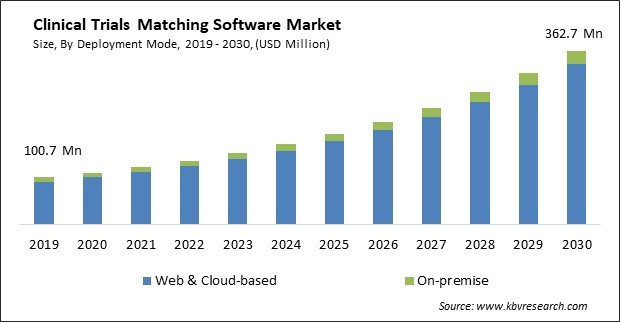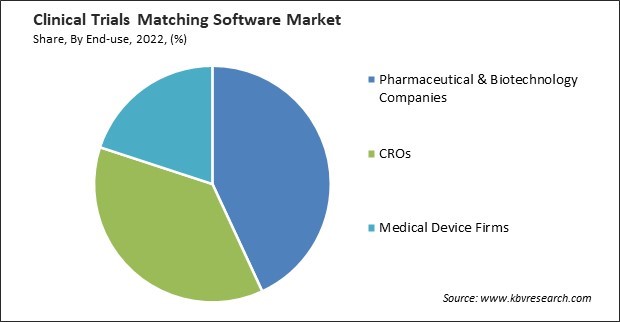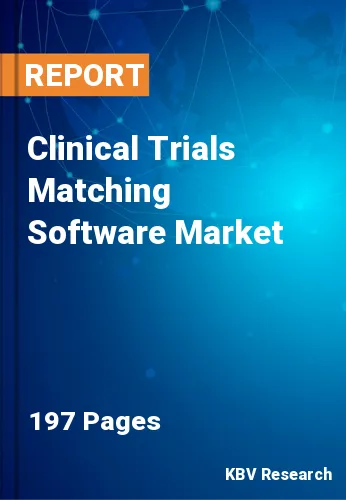The Global Clinical Trials Matching Software Market size is expected to reach $362.7 million by 2030, rising at a market growth of 13.5% CAGR during the forecast period.
Recent trends indicate that leading pharmaceutical companies are increasing R&D savings by substantially investing in R&D for long-term returns and nurturing collaborative research endeavors. Hence, Pharmaceutical & Biotechnology Companies segment would acquire around 2/5th share in the market by 2030. Increasing R&D expenditures in the pharmaceutical and biopharmaceutical industries are driving a shift toward comprehensive integrated or functionally outsourced services covering the entire drug discovery and development process, from early to late-stage development. Some of the factors impacting the market are Increasing market competition in clinical trials matching software, technological advancements in the market, and shortage of skilled professionals.

Market competition plays a significant role in the growth and development of the market. Increased competition can positively affect this industry, driving innovation, improving product offerings, and expanding the market. Competition encourages software providers to innovate and develop new features, functionalities, and technologies. Companies strive to differentiate themselves by offering unique solutions that address the evolving needs of pharmaceutical companies, research institutions, and healthcare organizations. Additionally, Technological advancements in the market have significantly transformed how clinical trials are conducted and managed. These innovations have improved efficiency, data accuracy, patient engagement, and trial success rates. AI and machine learning algorithms analyze large datasets quickly, helping researchers identify suitable patient cohorts and predict patient responses to treatments. As technology evolves, the industry will likely see further innovations that enhance the conduct and management of clinical trials. These factors will expand market growth.
Moreover, The COVID-19 pandemic significantly impacted various aspects of the healthcare industry, including the market. The COVID-19 pandemic underscored the importance of clinical trials in drug development and public health. This increased awareness and urgency drove more significant demand for clinical trials matching software as researchers and pharmaceutical companies sought to accelerate trials related to COVID-19 treatments and vaccines. The pandemic emphasized the need for more efficient data sharing and analysis in the healthcare and clinical trials sectors. Clinical trials matching software evolved to incorporate better data integration capabilities, enabling faster and more accurate matching of patients with trials. Regulatory agencies, such as the FDA in the United States, implemented expedited review processes for COVID-19-related clinical trials.
However, Contract research organizations (CROs) struggle to locate and retain qualified personnel. They compete with pharmaceutical companies, biotechnology companies, medical device manufacturers, and academic research institutions for skilled and seasoned scientists. To effectively compete, these businesses must increase pay and benefits. However, this can have a negative effect on their finances and outcomes, particularly for small-scale clinical trial service providers. This shortage of qualified professionals may impede the adoption of new technologies and methodologies and the market's growth over the next few years. In the coming years, the rising demand for outsourcing these services to CROs is anticipated to drive market expansion, but the lack of skilled workers can restrain market growth.
Based on end-use, the market is fragmented into pharmaceutical & biotechnology companies, CROs, and medical device firms. In 2022, the pharmaceutical and biotechnology companies segment held the highest revenue share in the market. Pharmaceutical and biotechnology companies play a significant role in the market. These companies are involved in the research, development, and testing of new drugs and therapies, and they rely on clinical trials matching software to identify suitable participants for their studies. Clinical trials matching software is an integral part of the drug development process for pharmaceutical and biotechnology companies. It helps streamline various aspects of clinical trials, from patient recruitment to data analysis, ultimately contributing to the successful development and approval of new drugs and therapies.

On the basis of Deployment Mode, the market is segmented into web & cloud based and on-premises. The on-premises segment acquired a substantial revenue share in the c market in 2022. On-premises-based deployment in the market refers to the installation and operation of the software within the physical infrastructure of a healthcare organization or research institution, as opposed to utilizing cloud-based or web-based solutions. On-premises solutions often provide more extensive customization options. Clinical trials matching software can be tailored to meet specific institutional requirements, ensuring it aligns perfectly with the organization's workflow and needs. On-premises deployment in the market provides organizations with benefits for control, customization, and data security.
| Report Attribute | Details |
|---|---|
| Market size value in 2022 | USD 133.8 Million |
| Market size forecast in 2030 | USD 362.7 Million |
| Base Year | 2022 |
| Historical Period | 2019 to 2021 |
| Forecast Period | 2023 to 2030 |
| Revenue Growth Rate | CAGR of 13.5% from 2023 to 2030 |
| Number of Pages | 197 |
| Number of Table | 250 |
| Report coverage | Market Trends, Revenue Estimation and Forecast, Segmentation Analysis, Regional and Country Breakdown, Companies Strategic Developments, Company Profiling |
| Segments covered | Deployment Mode, End-use, Region |
| Country scope | US, Canada, Mexico, Germany, UK, France, Russia, Spain, Italy, China, Japan, India, South Korea, Singapore, Malaysia, Brazil, Argentina, UAE, Saudi Arabia, South Africa, Nigeria |
| Growth Drivers |
|
| Restraints |
|
Region-wise, the market is analyzed across North America, Europe, Asia Pacific, and LAMEA. In 2022, the North America region registered the highest revenue share in the market. Due to the rise in clinical trials matching software adoption by pharmaceutical and biotechnology firms in the U.S. In addition, the region has a robust and well-established pharmaceutical industry, and numerous companies are investing in creating clinical trial matching software, propelling market expansion. In addition, the regulatory environment benefits from developing and implementing clinical trial matching software. Diverse initiatives relating to IT and AI-based solutions and the increased adoption of clinical trials matching and patient-matching software contribute to expanding the regional market.
Free Valuable Insights: Global Clinical Trials Matching Software Market size to reach USD 362.7 Million by 2030
The market research report covers the analysis of key stakeholders of the market. Key companies profiled in the report include Clario, IBM Corporation, Antidote Technologies, Inc., Ofni Systems Inc., Advarra, Inc., ArisGlobal LLC (Nordic Capital Limited), Teckro, Inc., BSI Business Systems Integration AG, Clinical Trials Mobile Application, Optimapharm d.o.o.
By Deployment Mode
By End-use
By Geography
The Market size is projected to reach USD 362.7 million by 2030.
Increasing market competition in clinical trials matching software are driving the Market in coming years, Shortage of skilled professionals restraints the growth of the Market.
Clario, IBM Corporation, Antidote Technologies, Inc., Ofni Systems Inc., Advarra, Inc., ArisGlobal LLC (Nordic Capital Limited), Teckro, Inc., BSI Business Systems Integration AG, Clinical Trials Mobile Application, Optimapharm d.o.o.
The expected CAGR of this Market is 13.5% from 2023 to 2030.
The Web & Cloud-based segment is generating the highest revenue in the Market, by Deployment Mode in 2022; thereby, achieving a market value of $334.7 million by 2030.
The Web & Cloud-based segment is generating the highest revenue in the Market, by Deployment Mode in 2022; thereby, achieving a market value of $334.7 million by 2030.
Our team of dedicated experts can provide you with attractive expansion opportunities for your business.

